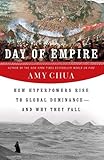Day of empire : how hyperpowers rise to global dominance--and why they fall / Amy Chua.
Material type: TextPublication details: New York : Doubleday, c2007.Edition: 1st edDescription: xxxiv, 396 p. ; 24 cmISBN:
TextPublication details: New York : Doubleday, c2007.Edition: 1st edDescription: xxxiv, 396 p. ; 24 cmISBN: - 9780385512848
- 0385512848
- 327.1/12
- JC 359 C559d 2007
| Item type | Current library | Home library | Collection | Shelving location | Call number | Vol info | Copy number | Status | Date due | Barcode |
|---|---|---|---|---|---|---|---|---|---|---|
 Libro
Libro
|
Biblioteca Juan Bosch | Biblioteca Juan Bosch | Ciencias Sociales | Ciencias Sociales (3er. Piso) | JC 359 C559d 2007 (Browse shelf(Opens below)) | 1 | 1 | Available | 00000052162 |
Includes bibliographical references (p. [345]-382) and index.
The first hegemon : the great Persian empire from Cyrus to Alexander -- Tolerance in Rome's high empire : gladiators, togas, and imperial glue -- China's golden age : the mix-blooded Tang dynasty -- The great Mongol empire : cosmopolitan barbarians -- The "purification" of medieval Spain : inquisition, expulsion, and the price of intolerance -- The Dutch world empire : diamonds, damask, and every "mongrel sect in Christendom" -- Tolerance and intolerance in the East : the Ottoman, Ming, and Mughal empires -- The British empire : "rebel buggers" and the "white man's burden" -- The American hyperpower : tolerance and the microchip -- The rise and fall of the Axis Powers : the strategic price of intolerance -- The challengers : China, the European Union, and India in the twenty-first century -- The day of empire : lessons of history.
Historians have long debated the rise and fall of empires. To date, however, no one has studied the far rarer phenomenon of hyperpowers--those few societies that amassed such extraordinary military and economic might that they essentially dominated the world. Here, globalization expert Chua explains how hyperpowers rise and why they fall. She examines history's hyperpowers--Persia, Rome, Tang China, the Mongols, the Dutch, the British, and the United States--and reveals the reasons behind their success, as well as the roots of their ultimate demise. For all their differences, she argues, every one of these world-dominant powers was, at least by the standards of its time, extraordinarily pluralistic and tolerant, succeeding by harnessing the skills and energies of individuals from very different backgrounds. But Chua also uncovers a great historical irony: in virtually every instance, multicultural tolerance eventually sowed the seeds of decline, and diversity became a liability.--From publisher description.


There are no comments on this title.